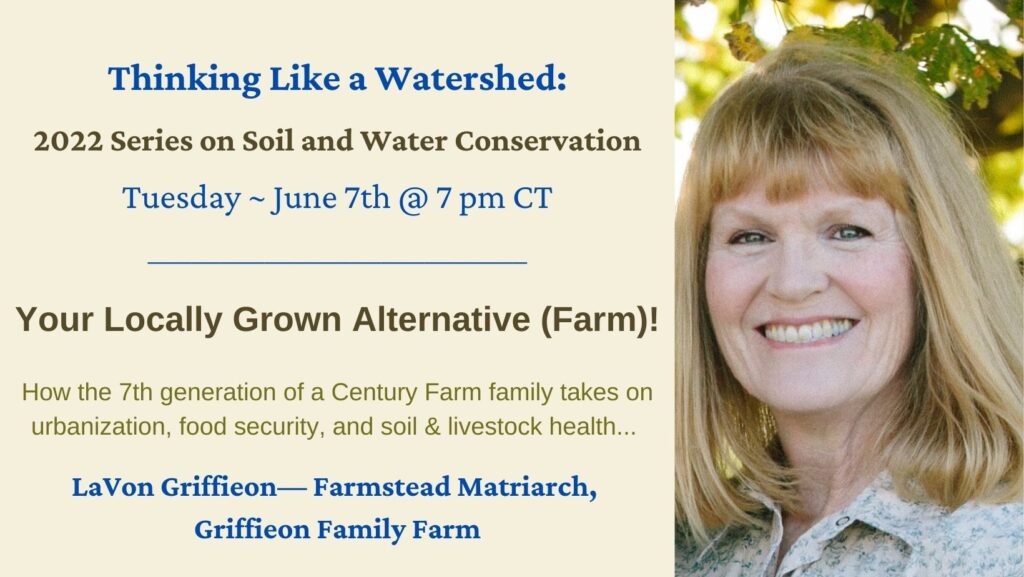—September sunlight on the Mississippi River

September sunlight on the Mississippi River South of I80, Photo by: Christine Curry
Century Celebration—
The Des Moines Chapter celebrated its 100th birthday September 12th. What a great success it was. Truly, this was an excellent example of bipartisan support for conservation in the same room. Celebrating and learning about the past century of Izaak Walton, Ding Darling, Aldo Leopold and the league brought over 145 people together. President Doug Pooch recognized past and present leadership and notables in the room. The chapter received a proclamation document from the Des Moines Mayor, Frank Cownie. There were many other environmental organizations represented, including Representative Robert Bacon, Chair of the house Natural Resources Committee. Several awards were given out to recognize outstanding services in conservation. Silent and Live auctions captured over $2,000. Part of the funds raised will go towards the National IWL’s 2nd Century campaign.




Fall Save Our Streams Trainings—
Fall field trainings in Iowa are on the calendar! Field trainings are a crucial component of Save Our Streams volunteer certification, where we demonstrate and practice sampling techniques in the stream. You can find a list of field trainings currently scheduled in Iowa below. Please share these trainings with others in your community who are interested in getting involved with Save Our Streams.
Oct 8: Bellevue, IA
Oct. 9: Maquoketa, IA
Oct. 15: McGregor, IA
Oct. 29: Clive, IA
Click here to learn more and register for an SOS field training!
Water monitoring with a Big Purpose continues—
September’s monthly monitoring included many streams and 2 teams of volunteers. All went well. The data collected shifts depending on whether we have rain or not. Check out the IWL’s national Clean Water Hub to learn more about the data collected during June, July, August & September!

Press Release—
League Defends Clean Water Act by Submitting an Amicus Brief to Supreme Court in Sackett v. EPA
09/23/2022
GAITHERSBURG, Md. September 23, 2022
The Izaak Walton League of America has joined other conservation groups in an amicus brief in Sackett v. EPA to highlight the absence of any legal foundation for the case and the devastating impacts it would have on wetland conservation, outdoor recreation and water quality.
The case, the very first to be heard by the Supreme Court in October, has the potential to eviscerate protections for wetlands and degrade water quality nationwide. If the Court agrees with the petitioners, the Sacketts, wetlands will no longer by protected by the Clean Water Act unless they meet the requirements of a subjective two-part test proposed by the Sacketts. That test would protect wetlands from being drained and filled only if the wetland has a relatively permanent continuous surface water connection to an adjacent water and the adjacent water is a traditionally navigable water or water body related to interstate commerce.
That proposed test is wholly unsupported by the plain language of the law, overwhelming science and common sense. If adopted by the Supreme Court, the majority of wetlands in the U.S. would lose protection under the Clean Water Act.
The Law
Congress passed the Clean Water Act in 1972, and its purpose, spelled out in its text, is “to restore and maintain the chemical, physical, and biological integrity of the Nation’s waters.” The law also explicitly aims at advancing the “protection and propagation of fish, shellfish, and wildlife,” and promoting “recreation in and on the water.”
The Science
Wetlands regulate waterflow, filter out pollutants and disperse sediment. Even so-called “isolated” or “non-adjacent” wetlands that lack a continuous surface connection to another body of water can directly affect the chemical, physical and biological integrity of downstream waters through continuous underground and periodic surface connections.
What’s at Stake?
If adopted, the Sackett test would deny federal protections to the majority of the nation’s wetlands. Areas that would be affected range from the Florida Everglades, which depend on the health of upstream waters, to the Missouri River and the wetlands adjacent to its headwaters in Montana, fed by ephemeral streams.
Since 1922, the Izaak Walton League has fought to protect clean water and wetlands—with many successes. The Clean Water Act is rightfully lauded because it provides essential and consistent protections that have dramatically improved water quality for nearly every American.
Organizations submitting the amicus brief with the Izaak Walton League include the Theodore Roosevelt Conservation Partnership, National Wildlife Federation, Backcountry Hunters and Anglers, National Parks Conservation Association, Trout Unlimited and American Fly Fishing Trade Association. To view the amicus brief click here!
The amicus brief filed by the Izaak Walton League and other conservation groups can be viewed here! .
Founded in 1922, the Izaak Walton League fights for clean air and water, healthy fish and wildlife habitat and conservation of our natural resources for future generations. The League plays a unique role in supporting community-based conservation and volunteer science and has a long legacy of shaping sound national policy.
Contact:
Michael Reinemer, Director of Communications, Izaak Walton League of America, mreinemer@iwla.org, 301-548-0105 ext. 220
Izaak Walton League’s Janette Rosebaum was quoted in an amicus brief to the #SupremeCourt. “This case about the Clean Water Act is going to be a big deal, potentially affecting more than half of streams and wetlands in the United States. Plus, it will be the first case heard by Justice Brown Jackson!” says Janette. She is really excited to be a part of this!
We’ve done the research, and we oppose pipelines
We are a group of concerned Iowans, farmland owners, academics, nonprofit leaders, and environmental advocates who have urged the Iowa Utilities Board to reject permit applications for carbon dioxide pipelines that would run across Iowa. We recognize that climate change is driven by emissions of greenhouse gases, including carbon dioxide, and we support clean, safe, sustainable, and locally controlled and locally owned energy. But we can do better than the proposed pipelines. Science indicates that they are poor investments and unlikely to have a meaningful effect on reducing greenhouse gas emissions.
We filed a letter on July 29, 2022, with the Iowa Utilities Board and laid out four science-based objections to the projects proposed by Summit Carbon Solutions, Navigator CO2 Ventures, and Archer Daniels Midland partnered with Wolf Carbon Solutions. Our objections are based on publicly funded scientific and engineering studies; links to these studies can be found in our letter to the board.
Soil degradation, reduced crop yields. Iowa State University scientists recently published a study that examined crop yields in areas of fields affected by underground oil pipeline construction. They found that subsoil compaction reduced corn yields by 15% and soybean yields by 25% for at least several years after pipeline completion. Farmers are aware of these effects and are reluctant to allow degradation of their land by pipeline construction. To date, at least 40 county boards of supervisors in Iowa have filed objections to the proposed pipelines.
Minor reductions in greenhouse gas emissions.Capturing carbon dioxide generated during the process of fermentation at ethanol plants and then transporting it by pipelines through Iowa and other states and storing it underground would have trivial effects on our nation’s carbon dioxide emissions. Carbon dioxide emissions in the U.S. in 2020 were 110 times greater than the amount that might be captured at all our nation’s ethanol plants under the most favorable projections.
Carbon dioxide emitted from tailpipes would greatly exceed what pipelines would transport. The use of ethanol in our cars contributes to greenhouse gas emissions, which exacerbate our ever-increasing climate crisis. Tail-pipe emissions from U.S. vehicles in 2020 using gasoline blended with 10% ethanol (E10) were almost 25 times greater than the 43 million metric tons of carbon dioxide that could potentially be captured at all the nation’s ethanol plants. Because vehicles using ethanol rather than regular gasoline typically get 4% to 5% fewer miles per gallon of fuel consumed, due to the lower energy content of ethanol, carbon dioxide emissions per mile traveled are as high or higher for ethanol blends as for pure gasoline.
Corruption of the ideal of private sacrifice for public good. The power of eminent domain, which allows private land to be condemned, is granted to governments carefully and must be executed carefully. This process should be used only for projects serving substantial public interest. Given the link between soil health, farm productivity, and forest and grassland integrity, a very large benefit to the public should accrue to offset the damage incurred from building private carbon dioxidepipelines through the fields and timber of hundreds of Iowa citizens. Because the carbon dioxide transported by pipelines from ethanol plants for underground storage would hardly dent U.S. greenhouse gas emissions while incurring substantial damage to private land, we believe insufficient public benefit would accrue from allowing private pipeline projects to proceed using eminent domain.
There are better opportunities for Iowa to reduce greenhouse gas emissions than through the construction of carbon dioxide pipelines. We ask that concerned citizens speak out against the proposed pipelines and file their objections with the IUB.
Matt Liebman is professor emeritus of agronomy at Iowa State University. Elizabeth Garst is a conservation farmland owner. Neil Hamilton is professor emeritus of agricultural law at Drake University and a Dallas County soil and water commissioner.
Support for this essay is provided by Linda D. Appelgate, retired USDA/NRCS resource conservationist; Laura Belin, editor and publisher of Bleeding Heartland; Patricia Boddy, retired agricultural engineer; Christine Curry, environment and conservation advocate; Mike Delaney, professor emeritus of environmental sociology, Des Moines Area Community College; Cornelia B. Flora, distinguished professor of agriculture and life sciences emerita, Iowa State University; Chris Henning, farm owner and manager; Susan Judkins, conservation advocate; Mary Ellen Miller, Wayne County soil and water conservation district commissioner; David Osterberg, professor emeritus of public health, University of Iowa; Mark Rasmussen, professor emeritus, Iowa State University; Ralph Rosenberg, former executive director, Iowa Environmental Council, and former Iowa state representative and senator; Larry A. Stone, farmland owner and environmental advocate; and Tim Wagner, conservation advocate, Iowa Coldwater Conservancy.
2022 Thinking Like a Watershed programs—
UMRI’s “Thinking Like a Watershed” series has gone fishin’!
Not wishing to compete with long summer days – and who would want to! – we hosted our final 2022 “Thinking Like a Watershed” episode on June 7th. Go outside! We will see you in January for stories to inspire a winter’s night, as told by ourselves and good partners on this road to a better landscape.
The linked recording of the June 7th presentation – by the head of a 7th generation farm creatively grappling with urban sprawl – is below, as are links to all past programs. Take a listen, take some hope, and let us know if you would like us to consider a certain someone or topic in programs to come. And if you are new to the series, we use these words to describe what shapes it: This monthly series is a project of the Upper Mississippi River Initiative (UMRI) of the Izaak Walton League of America, with co-hosts Chris Henning of the Panora Conservation Chapter and Des Moines Chapter Communication Director, Bud Hartley. We feature guests for 30-40 minute presentations that shed daylight on good works done in the name of the Mississippi and its uplands. In this way we uplift our shared goals for a cleaner river, a cared for environment, and kinder communities. Recorded programs are available shortly after they air live.
“Your Locally Grown Alternative (Farm!)” with a conversation with LaVon Griffieon on, “How the seventh generation of a century farm family takes on urbanization, food security, and soil and livestock health.”
Farmstead matriarch, LaVon shares her story about how they have created special niche markets on their 7th generation family farm. She weighs in on the good, the bad and the ups, and the downs of keeping their family farm relevant as rural landscapes around them continue to turn into suburban developments. During this transformation, hundreds of acres of our agriculture’s best top soil disappears, as does the rural land that has potential to grow real food in Iowa and reduce 90% of imported foods..
To learn more about the Griffieon’s farm click here!
If you’re interested in learning more about the Power of Data, you’ll want to watch the recording of our May 3rd Thinking Like a Watershed program: “Stream TEAM Science is (slowly) shifting policy”— a conversation with leaders Larry Dolphin, Bill Buckley, Mark Owens, lifelong members of the Izaak Walton League (IWLA), and Josh Balk, Iowa Department of Natural Resources (DNR) on How E. coli and DNA data changed Mower Co. septic system practices. This is a perfect example of how citizens’ science water monitoring with a purpose has worked to build relationships and positive change to improve water quality in a watershed filled with concentrated animal feeding operations and people.
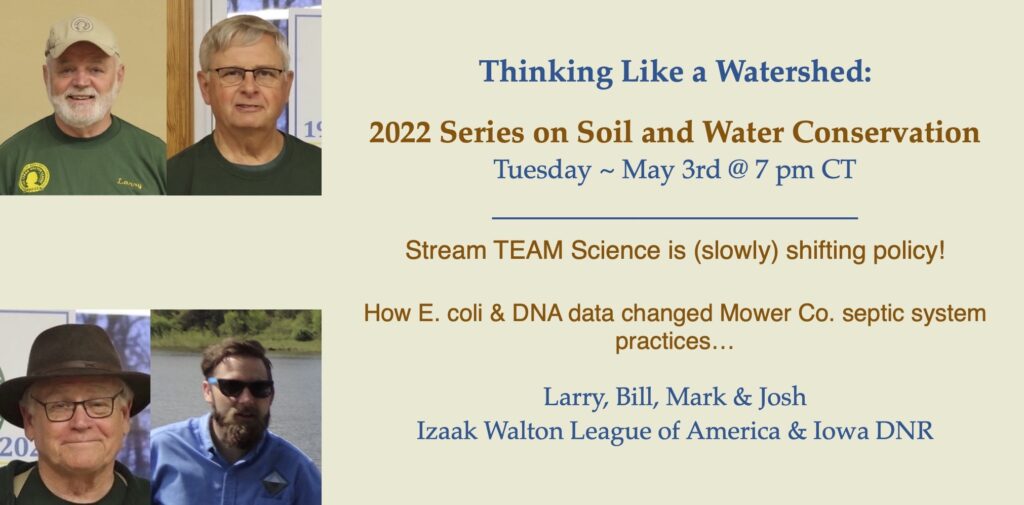
If you missed our April presentation, here is the link: The 2023 Farm Bill after 100 Years of Conservation! with Duane Hovorka, Agriculture Program Director, Izaak Walton League of America
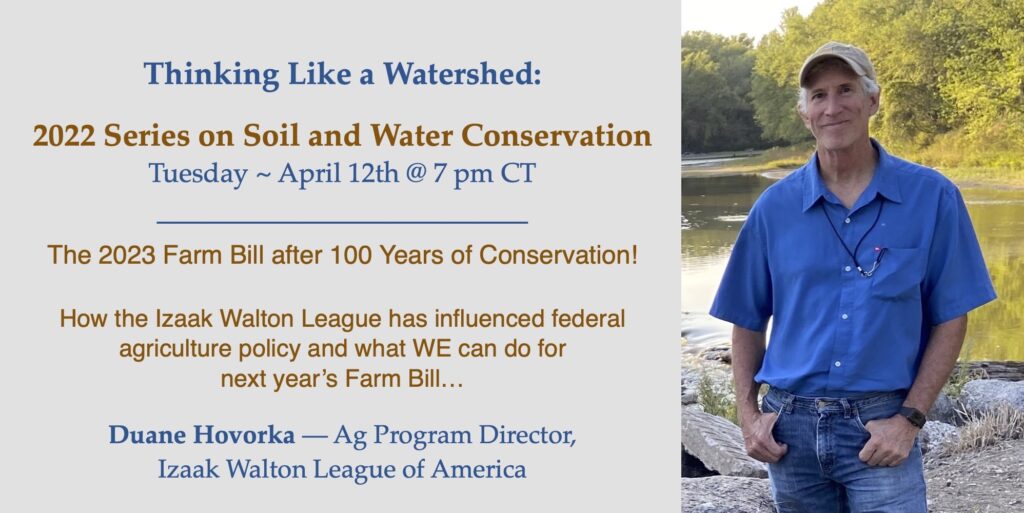
The League played an instrumental role in “groundbreaking environmental victories” during the past 100 years. Duane highlights some of those accomplishments, such as the creation of the Soil Bank in 1956, the Clean Water Act in 1972, the Conservation Reserve Program in 1985, and the Conservation Stewardship Program in 2002.
Duane summarized the 2023 Farm Bill suggestions he’s heard during winter listening sessions. He shares some of the best ideas that others have been sharing to help the Izaak Walton League prioritize solutions.
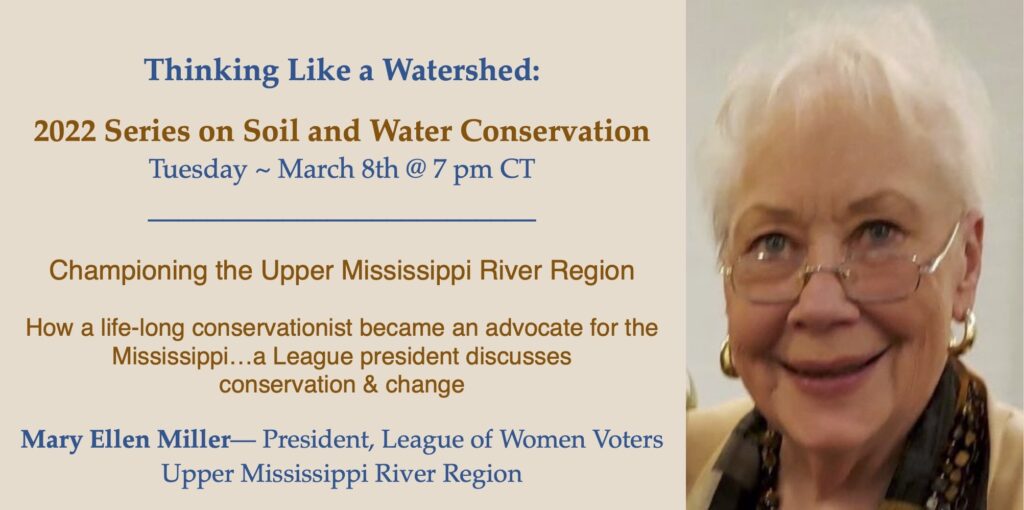
— “Championing the Upper Mississippi River Region” Thinking Like a Watershed ~ Mary Ellen Miller— March 8th, 2022 How a life-long conservationist became an advocate for the Mississippi…a League president discusses conservation & change with Mary Ellen Miller, President, League of Women Voters Upper Mississippi River Region
Our February program featured Kelly McGinnis the executive director of the Mississippi River Network which includes 58 organizations including the Izaak Walton League and several of our UMRI partners.
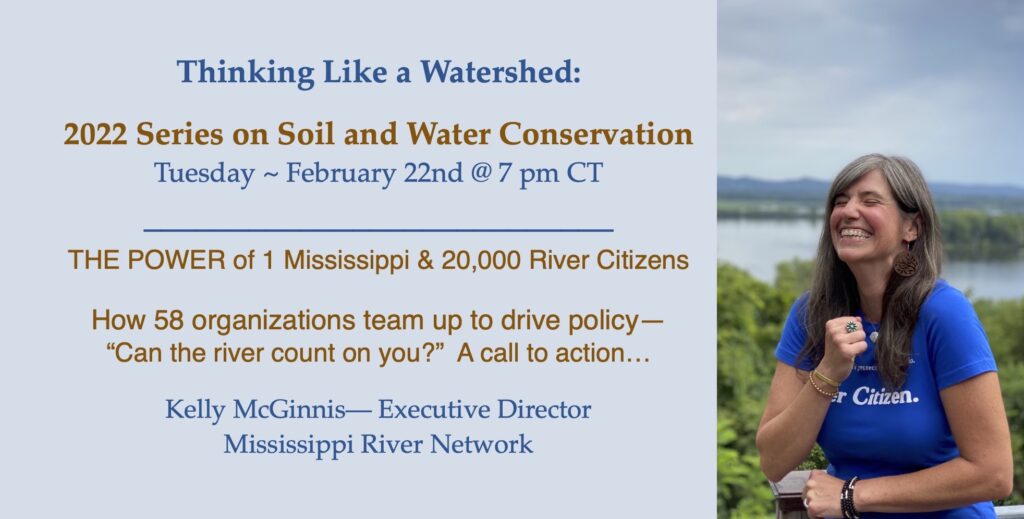
—“The POWER of 1 Mississippi & 20,000 River Citizens” Thinking Like a Watershed ~ Kelly McGinnis— February 22nd, 2022 How 58 organizations team up to drive policy—“Can the river count on you?” A call to action…
Kelly shared the power of the Mississippi River Network’s (MRN) use of public outreach and policy advocacy such as the Mississippi River Restoration and Resilience Initiative Act. You’ll find out about the activities of the network, a coalition of 58 organizations dedicated to creating a healthier Mississippi River by working for the well-being of the people, land, water, and wildlife of America’s largest watershed.
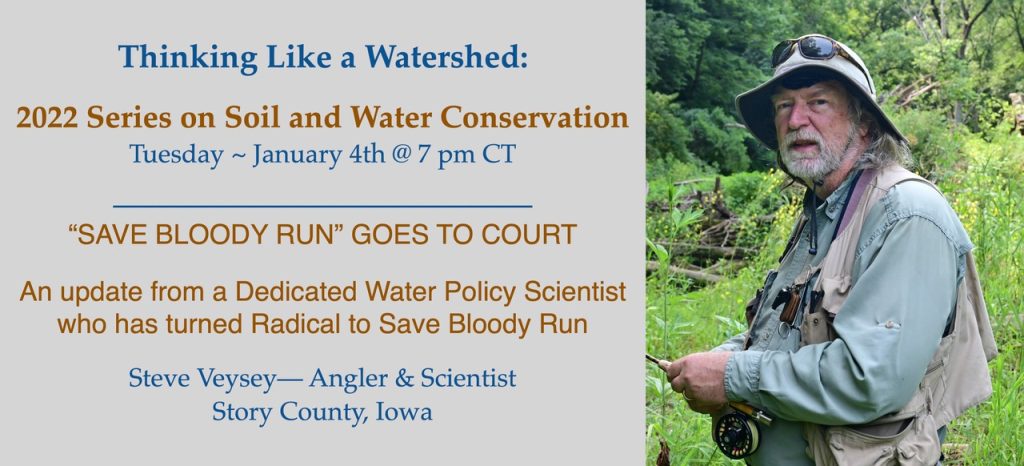
Photo by: David Thoreson
Our January program was kicked off with an update from Save Bloody Run. Where we learned the latest details from water policy scientist, Steve Veysey.“Save Bloody Run Goes to Court” Thinking Like a Watershed ~ Steve Veysey— January 4th, 2022 An update from a Dedicated Water Policy Scientist who has turned Radical to Save Bloody Run.
2021 Thinking Like a Watershed Programs—
— “Heartland Heroines” Thinking Like a Watershed ~ Robin Moore & Denise O’Brien— June 1, 2021 How two savvy conservationists empower working farm landowners to put their inner land ethic to work.
— “Planting Seeds to Grow Vibrant Communities” Thinking Like a Watershed ~ Chris Deal & Art Cullen— May 4, 2021 How Jefferson, Iowa’s Chris Deal is working with California Rep. Ro Khanna and others to grow vibrant rural communities in the Heartland with perspectives from Pulitzer Prize—winning journalist and editor of The Storm Lake Times, Art Cullen.
—“Watershed Bridges— Green to Blue”: Thinking Like a Watershed ~ Vicki Nichols Goldstein & Seth Watkins— April 6, 2021 How improving soil health and water quality in Iowa and other inland states benefit watersheds that provide critical services from land to sea.
— “Local Heroes in Howard County”: Thinking Like a Watershed ~ Neil Shaffer & Hunter Slifka— March 2, 2021 How they have incorporated several thousand acres of land under conservation programs–the largest percentage in Iowa.
—“The Accidental Conservationist”: Thinking Like a Watershed ~ Wayne Fredericks— February 2, 2021 How an Iowa Farmer is Improving Natural Capital while Increasing Profits with Conservationist and Farmer, Wayne Fredericks from Mitchell County, Iowa.
Learn more—
Izaak Walton League provides a fun educational outdoor activity for the entire family…
Learn more here!
To help celebrate the Izaak Walton Leagues’ 100th anniversary in 2022, The Des Moines Chapter is heading up an effort to expand the Izaak Walton League’s SOS (Save our Streams) program throughout Iowa. This is the only nationwide program training volunteers to protect waterways from pollution and to bring information about water quality to their communities.
The IWL’s history: At the turn of the 20th century, uncontrolled discharges of industrial waste and raw sewage, unrestricted logging, and soil erosion threatened to destroy the nation’s most productive waterways. The country’s forests, wetlands, and wilderness areas were quickly disappearing. In 1922, 54 sportsmen declared that it was “time to call a halt” to this destruction. Aware that action – not just talk – would be necessary to solve these problems, the group decided to form an organization to combat water pollution and protect the country’s woods and wildlife. As a reminder of their purpose, they named the organization after Izaak Walton, the 17th-century English angler-conservationist who wrote the literary classic The Compleat Angler.
“Defenders of Soil, Air, Woods, Waters & Wildlife”
Continue to Stay Safe and Stay Engaged…
Save our Streams—On-line training to become a certified Izaak Walton League’s Save Our Stream monitor
Click Here to learn more about Save Bloody Run
— Izaak Walton League’s Outdoor America articles on line.
—About water quality monitoring and research, check out The University of Iowa’s Chris Jones blog who has published several articles on where Iowa stands with regards to soil health and water quality.
—Wait no longer to watch, re-watch and share PFI’s full-length film, “Livestock on the Land“. Please help us get this to as many viewers as possible – farmers, eaters, citizens and policymakers.
—Iowa Farmers Union Events, check out their amazing weekly webinars…
—Iowa Environmental Council’s Event page is packed with fabulous opportunities to learn more from their organization and others.

